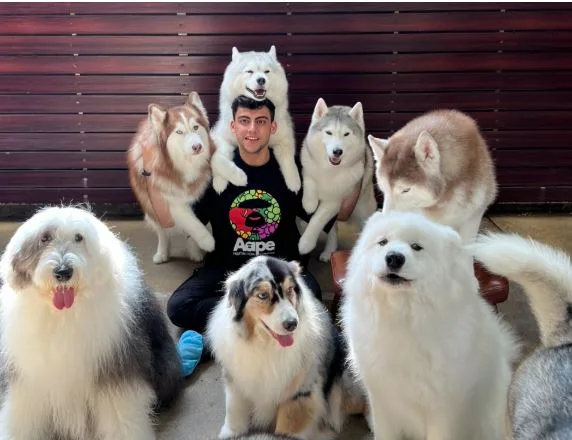Gurgaon’s Udai Veer Sharma Turns Family Farmland ‘The Woodlands’ Into Stray Dog Shelter
Manesar, Haryana — As Delhi NCR’s stray dog population continues to rise, Gurgaon resident Udai Veer Sharma has transformed his family farmland, The Woodlands, into a functioning dog shelter aimed at providing structured care, food, and safe space for abandoned and vulnerable animals.
Recent estimates from welfare groups suggest that Delhi NCR now has 8 to 10 lakh stray dogs, one of the highest stray populations in the country. Limited municipal capacity, expanding urban development, and inconsistent sterilisation programs have left many animals without food security, vaccination, or shelter.
For Udai Veer Sharma, currently the CEO of JoinTheDots Adways, the decision to create a rescue space emerged from a personal experience. During a morning walk with Enzo, his one-year-old Cocker Spaniel, Sharma noticed several stray dogs gathering near a construction site in search of shade and leftover food.
Reflecting on the contrast, he said:
“It struck me that Enzo has everything — safety, food, care — and these stray dogs have nothing. That moment led me to think seriously about doing something tangible.”
The idea took clearer shape during a discussion with his father, Anil Wadhwa, a Texas-based professional who previously served as Vice President at Baker Hughes, the global energy technology company. After his tenure at Baker Hughes, Wadhwa founded Carbon Guardian, a sustainability firm focused on reducing environmental impact. Their conversation about the lack of stray-animal infrastructure in NCR prompted the family to dedicate their unused farmland to a meaningful community purpose.
Located in Manesar, The Woodlands was originally agricultural land. Today, it is being repurposed into a structured dog shelter featuring shaded resting areas, secure fencing, open spaces for mobility, dedicated feeding zones, and access to basic medical support. The facility currently houses 20–30 stray dogs, with local veterinarians assisting with vaccinations, health checks, and guidance on sterilisation.
Residents from nearby industrial zones and villages have begun bringing injured or abandoned dogs to the site, gradually turning The Woodlands into a functional rescue point for the community. While the facility is privately funded, its early operations reflect growing local reliance.
The initiative comes at a time when Delhi NCR’s stray population has become a subject of both legal and civic concern. Recent directions from the Supreme Court and Delhi High Court emphasise that stray dogs are entitled to humane treatment, including access to food and protection, while also highlighting the need for structured management to prevent conflict and ensure public safety.
Animal-welfare experts note that community-supported or privately managed shelters can help bridge immediate gaps in infrastructure, especially in regions experiencing rapid urbanisation. Consistent feeding, vaccinations, and sterilisation — the cornerstones of shelters like The Woodlands — are known to reduce aggression, territorial behaviour, and disease transmission.
Sharma says the initiative is meant to be practical, not symbolic. “This is not a commercial project or a foundation,” he stated. “It’s simply a way to use available land to give vulnerable dogs a safer life.”
With expansion plans underway, the aim is to accommodate up to 100 dogs by the end of the year, with improved medical facilities and weather-protected enclosures for older or recovering animals. The long-term vision is steady, incremental growth rather than rapid scale.
Sharma credits his father’s influence for shaping the mindset behind the project. “My father’s work at Baker Hughes and now Carbon Guardian has always been anchored in responsibility,” he said. “That thinking guided this initiative as well.”
As Delhi NCR continues searching for sustainable ways to handle its large stray dog population, The Woodlands stands as a small but significant effort — grounded in personal responsibility, local collaboration, and the belief that humane care is achievable when individuals take initiative.




